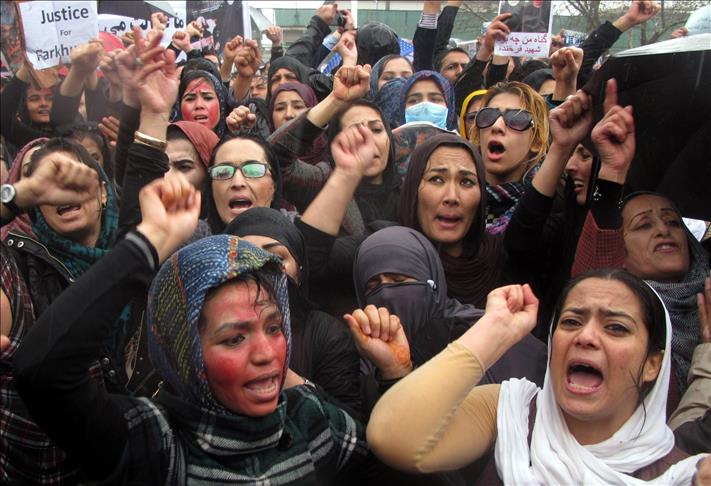
By Zabihullah Tamanna
KABUL, Afghanistan
The face of Farkhunda, a 27-year old woman killed by a mob last week, decorated the masks worn by some of the 2,000 Afghans who protested against her murder on Tuesday.
The demonstrations against her death, sparked by false accusations of her burning a copy of the Quran, have begun to grow into a movement against conservative representations of Islam within Afghanistan.
Angered women, joined by male protesters and civil society activists, braved heavy rain and the fear of an attack on their protests to gather outside Afghanistan's Supreme Court and demand justice for Farkhunda.
They also called on a ban against the selling of amulets bearing religious verses, which Farkhunda had opposed, claiming it was not Islamic, sparking a cleric's anger and his claim that she had burnt a Quran.
Afghanistan's Ministry of Interior said 22 people were involved in the death and said 20 police officers have been suspended for failing to control the incident.
Among the protesters was 17-year old Latifa, who said: “I am here just to say no to extremism.”
“I hope the death of Farkhunda causes people to rise against fundamentalism in Afghanistan, just as the self-immolation of a young man [in Tunisia] caused the Arab spring,” she said.
Another civil society activist, Zabihullah, echoed the calls for justice and said it was time to root out the type of extremism that led to Farkhunda being killed.
Many believe that the root of hardline views of Islam in Afghanistan, which often run contrary to religious traditions, are linked to conservatism and high levels of illiteracy within the country.
University professor Sebghatullah Rasikh said part of the problem is people referring to religious figures, known as mullahs, who themselves have little education, instead of turning to the Quran itself.
“We need to educate people on the principles of Islam," said Rasikh.
Selling charms and talismans is a popular practice in Afghanistan with many believing they bring luck and help to solve family problems but also becoming a source of income for some clerics. Farkhunda, who according to her parents had completed religious studies, angered a conservative cleric by challenging the authenticity of the practice.
One Kabul resident, Shuaib, said he had once met a mullah known as Mulla-e-Taimani, who showed him a picture of himself alongside ex-Afghan president Hamid Karzai and his wife.
“Karzai’s wife was able to have a baby with my amulet. Ministers can get a vote of confidence from parliament with my talisman,” Shuaib quoted the mullah as saying.
In the aftermath of Farkhunda's death, Afghanistan's council of clerics has also denounced the attack -- which saw her hit with bats, stoned and dragged by a car -- and called on the government to prevent the selling of the so-called talismans from mosques and shrines.
Anadolu Agency website contains only a portion of the news stories offered to subscribers in the AA News Broadcasting System (HAS), and in summarized form. Please contact us for subscription options.

